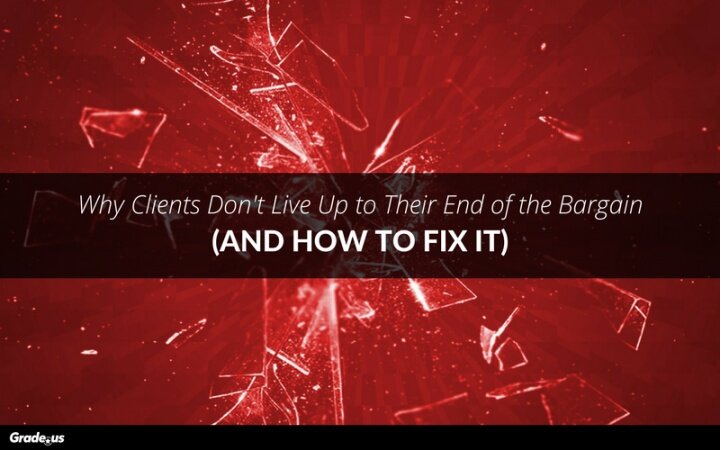- Joined
- Mar 15, 2016
- Messages
- 474
- Reaction score
- 252
Why Clients Don?t Live Up to Their End of the Bargain (and How to Fix It)

Read the rest of Andrew's Post here, to see the three ways he recommends in handling those clients in 'the second category'.


They?re refusing to help you.
Your clients have hired you to help their business. They?ve paid for your services and signed on the dotted line. But they?re refusing to do what you?ve asked.
They won?t give you the feedback you?re asking for. They drag their feet on getting you the materials you need to do an amazing job for them. Almost immediately, it seems like they?re actually trying to sabotage their project. It?s as if they?re trying to lose money.
What?s going on?
Why is it that some clients refuse to live up to their end of the bargain?
Credibility.
Low credibility starts the client relationship off on the wrong foot
Clients enter into a relationship with you with perceptions. These perceptions dictate how they see you and shapes how they?ll behave. BJ Fogg, researcher at Stanford?s Persuasive Technology Lab, stated there are four kinds of credibility.
1. Earned credibility. This is the kind of credibility you develop with clients who had a positive experience with you. Your customer service is excellent, you provide expert advice and you produce results.
2. Reputed credibility. Hundreds of positive reviews. A referral from an unbiased client whose experience has been positive. They?re pleased with your service so they decide to spread the word. They mention your agency to family, friends and acquaintances ? anyone who?s in the market for your service.
3. Presumed credibility. This is all about familiarity and assumptions. A client sees your advertising salvo on YouTube, Facebook or LinkedIn. ?I saw your interview on Business Insider and your guest posts on Forbes.? These clients develop a general familiarity with your brand. A brand they?ve heard of is more credible than one they haven?t.
4. Surface credibility. This refers to a client?s subjective opinion of your agency, brand or service (they?re in-demand, top notch service, they always get results, I think they?re trustworthy, etc.). A client looks at your business, takes stock of what they see and makes a judgment call.
To take things further, each credibility sub-type operates on a continuum. The further you are on the continuum, the more credible organization appears to be.
At least in your client?s mind.
This is incredibly important because agency clients sort the organizations they work with into groups. This sorting process is largely subconscious, it would be presumptuous to assume clients are making these decisions consciously. Here?s why this sorting process is so important.
It sets the tone of your relationship.
The solution? Build credibility in all four areas. Build a strong online review profile, get testimonials from clients, create a website and marketing campaign. Do what it takes to create a reputation that demonstrates authority and credibility.
Why go to the trouble?
Your credibility is a measurement of trust. The more credible you appear to be, the easier it is for clients to trust you. Agency clients are looking for a way to establish a kind of relational hierarchy. They?re looking to answer two very specific questions.
1. Do I need them more than they need me? Any agency that?s prominent, well received, with good standing in the marketplace has power. These agencies are great at what they do and they?re great at communicating their value. Clients approaching these agencies realize it?s an honor to be selected by these agencies. They?re usually on their best behavior.
2. Do they need me more than I need them? Agencies in this category are seen as less credible, though many of them are able to run circles around their more well-known competitors. Clients don?t know enough about the industry to be able to tell these agencies apart. So they go with the metrics they?re familiar with, price, product and service. Agencies in this category chase after clients, amplifying a prospect?s subconscious disdain.
Clients in the second category tend to misbehave.
These clients make one off demands. They?re often uncooperative, difficult to work with and even more difficult to please. Let?s say you?re an agency with clients in the second category?
Read the rest of Andrew's Post here, to see the three ways he recommends in handling those clients in 'the second category'.




